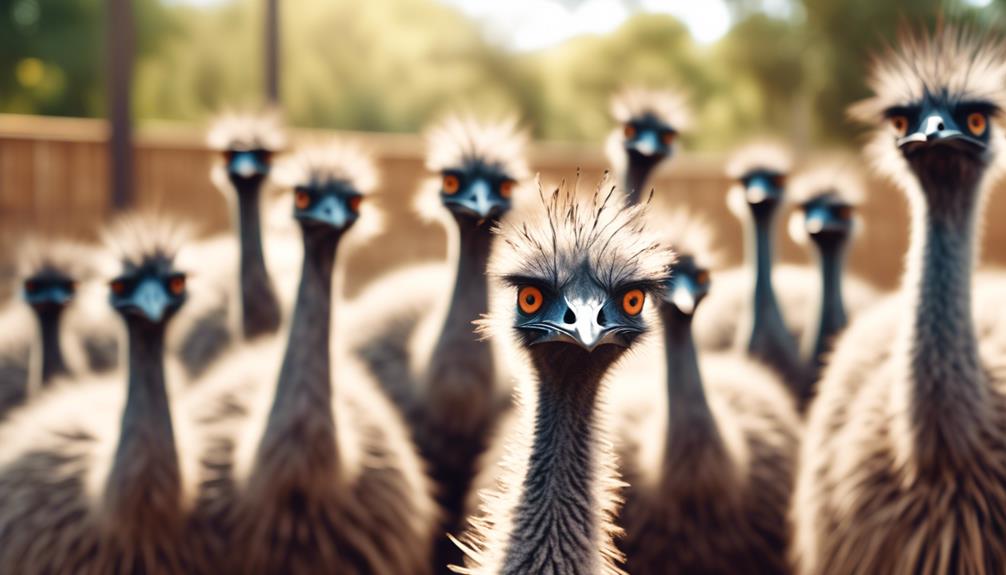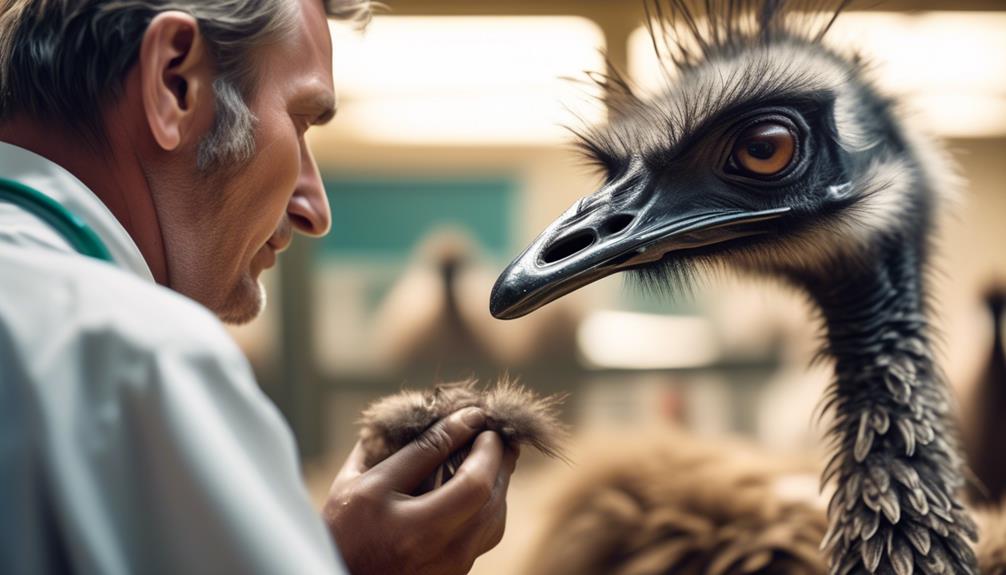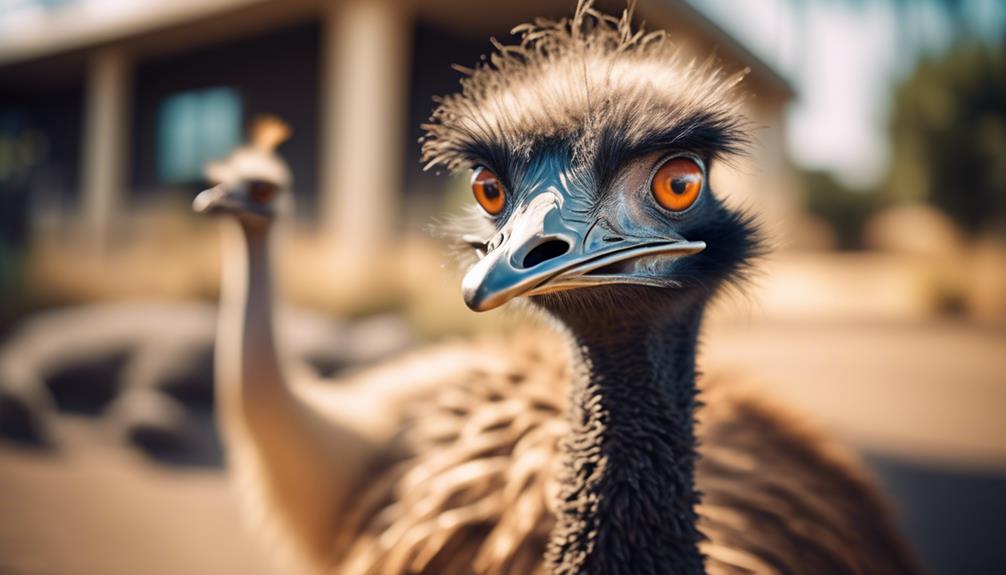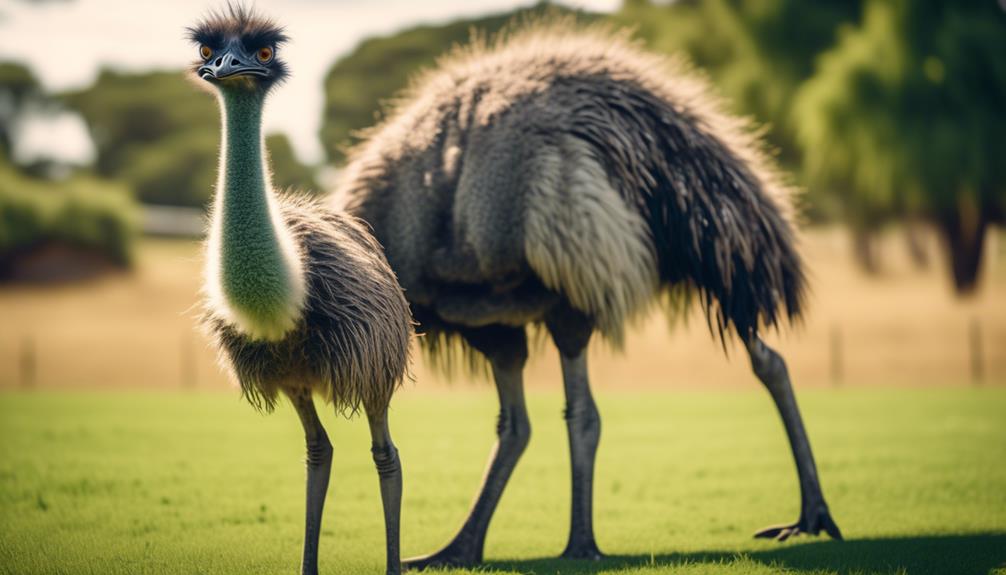
In the vast and remarkable world of emus, where grace meets resilience, there exists a delicate balance between health and vulnerability.
Though these magnificent creatures may seem invincible, they too face their fair share of health concerns. From avian influenza to gastrointestinal disorders, respiratory infections to feather mite infestations, the list is extensive and demands attention.
But fear not, for within this discussion, you will uncover the secrets of prevention and protection, ensuring the well-being of these majestic beings.
So, gather your curiosity and prepare yourself to discover the vital knowledge that will safeguard the emu population.
Key Takeaways
- Emus are susceptible to a variety of health concerns, including avian influenza, gastrointestinal disorders, respiratory infections, feather mite infestation, parasitic worms, skin infections, and nutritional deficiencies.
- Vaccinations and biosecurity measures play a crucial role in preventing and controlling these diseases in emus.
- Proper nutrition is essential for maintaining emu health and preventing nutritional deficiencies.
- Regular observation and monitoring of emus is necessary to identify any signs of lameness, joint problems, heat stress, dehydration, poisoning, or toxicity.
Avian Influenza
Avian influenza, also known as bird flu, is a highly infectious viral disease that primarily affects birds, but can also be transmitted to humans and other animals. The prevalence rates of avian influenza vary across different regions, with some areas experiencing occasional outbreaks while others have a more persistent presence of the virus. Transmission of avian influenza can occur through various methods, including direct contact with infected birds, exposure to contaminated surfaces or materials, and inhalation of respiratory droplets.
The prevalence rates of avian influenza are influenced by several factors, such as the density of bird populations, the presence of migratory birds, and the biosecurity measures in place. In regions where these factors align favorably for the virus, avian influenza can spread rapidly and have a significant impact on bird populations and the poultry industry.
Transmission of avian influenza can occur through different methods. Direct contact with infected birds, especially through close proximity or sharing of contaminated surfaces, is a common route of transmission. Additionally, the virus can be shed in the feces and respiratory secretions of infected birds, leading to contamination of the environment. Inhalation of respiratory droplets is another possible transmission method, particularly in situations where birds are housed in close quarters.
Understanding the prevalence rates and transmission methods of avian influenza is crucial for implementing effective prevention and control measures. By identifying high-risk areas and implementing appropriate biosecurity protocols, the spread of avian influenza can be minimized, protecting both bird populations and human health.
Gastrointestinal Disorders
Gastrointestinal disorders can pose significant health concerns for both humans and animals alike. Emus, being no exception, are prone to various gastrointestinal issues that can impact their overall well-being. Understanding the prevalence and causes of these disorders is crucial for effective management strategies to ensure the gastrointestinal health of emus.
In emus, gastrointestinal disorders can occur due to several factors. One common cause is dietary issues, such as improper feeding practices or consuming contaminated food. Emus have a sensitive digestive system, and any sudden changes in their diet can disrupt their gastrointestinal balance. Additionally, parasites, such as worms, can also lead to gastrointestinal problems in emus. These parasites can cause inflammation and damage to the intestinal lining, resulting in digestive disturbances.
To manage and maintain the gastrointestinal health of emus, several strategies can be implemented. Firstly, providing a balanced and appropriate diet is crucial. Emus should be fed a diet rich in fiber, vitamins, and minerals, while avoiding foods that may upset their digestion. Regular deworming is also essential to control parasite infestations. Additionally, maintaining proper hygiene in their environment and ensuring access to clean water can help prevent gastrointestinal issues.
Respiratory Infections

Respiratory infections are a common concern for the health and well-being of emus. They can significantly impact their respiratory system and overall physiological function. These infections are often caused by bacteria, viruses, or fungi. They can lead to symptoms such as coughing, sneezing, nasal discharge, and difficulty breathing.
Prevention methods play a crucial role in reducing the risk of respiratory infections in emus. It's important to provide a clean and well-ventilated environment for the birds. Poor air quality can contribute to the spread of respiratory pathogens. Regular cleaning and disinfection of the housing area, as well as proper waste management, can also help prevent the transmission of infectious agents. Additionally, maintaining a strong immune system through proper nutrition and regular veterinary check-ups can further reduce the likelihood of respiratory infections.
When it comes to treatment options, early detection is key. If an emu is showing signs of a respiratory infection, it's important to consult a veterinarian for an accurate diagnosis and appropriate treatment plan. Depending on the severity of the infection, treatment may involve antibiotics, antiviral medications, or supportive care such as providing a warm and comfortable environment for the affected bird.
Feather Mite Infestation
Feather mite infestation is another significant concern for the health and well-being of emus. These tiny parasites can greatly affect the condition of their feathers and overall physical state. Feather mites are common in emus and can cause a range of symptoms, including feather loss, itching, and skin irritation. These mites feed on the keratin in the feathers, leading to weakened and damaged plumage.
To prevent and control feather mite infestation in emus, it's important to maintain good hygiene and cleanliness in their living environment. Regularly cleaning and disinfecting their pens, as well as providing them with clean bedding, can help reduce the risk of mite infestation. Additionally, emus should be regularly examined for signs of mites, such as feather damage or excessive scratching.
If feather mites are detected, prompt treatment is necessary to prevent further infestation and minimize the negative effects on the emus' health. Treatment options may include topical or oral medications specifically designed to kill mites. It's essential to follow the instructions provided by a veterinarian to ensure proper dosing and application.
Parasitic Worms

Parasitic worms pose a significant threat to the health and well-being of emus, as they can cause a range of issues and complications. Emu health management should prioritize parasitic worm control to ensure the overall wellness of these magnificent birds. Here are two important points to consider:
- Regular deworming: Emus should be regularly dewormed to prevent parasitic worm infestation. Administering appropriate anthelmintic medications as recommended by a veterinarian is crucial in controlling the spread of worms. Regular deworming helps to reduce the risk of emus developing complications associated with worm infestations.
- Pasture rotation: Regularly rotating emus between pastures can help minimize the risk of parasitic worm transmission. By moving emus to fresh pastures, the number of infective worm larvae in the environment can be reduced, limiting the chances of emus ingesting them.
Emu health management should focus on preventing and controlling parasitic worms in order to maintain the well-being of these fascinating creatures. By implementing proactive measures such as regular deworming and pasture rotation, emu owners can effectively mitigate the risks associated with parasitic worm infestation. Remember, seeking guidance from a veterinarian is essential in developing an effective parasite control strategy for emus.
Skin Infections
Skin infections can be a common concern for emus, requiring proper management and treatment to ensure the overall health and well-being of these magnificent birds. Emus are susceptible to a variety of skin infections, including bacterial, fungal, and viral infections. These infections can cause discomfort and pain for the emus, and if left untreated, they can lead to more serious health issues.
Prevention methods play a crucial role in minimizing the risk of skin infections in emus. Maintaining good hygiene practices, such as regular cleaning and disinfection of enclosures, can help reduce the spread of bacteria and fungi. Additionally, providing a clean and dry environment for the emus can help prevent these infections from occurring. Regular inspection of the emus' skin and feathers can also help identify any potential signs of infection early on.
When it comes to treatment options for skin infections in emus, it's important to consult with a veterinarian who specializes in avian health. The veterinarian may recommend topical or oral medications to treat the infection, depending on the severity and type of infection. It's crucial to follow the veterinarian's instructions carefully and complete the full course of treatment to ensure the infection is completely eradicated.
Nutritional Deficiencies

To ensure the overall health and well-being of your emus, proper nutrition is essential to prevent and address potential deficiencies. Emus, like any living beings, require a balanced diet to thrive and avoid malnutrition.
Here are some dietary management approaches you can implement to prevent nutritional deficiencies in your emus:
- Provide a balanced diet: Emus need a combination of proteins, carbohydrates, fats, vitamins, and minerals to meet their nutritional requirements. Ensure that their diet includes a variety of sources, such as grains, fruits, vegetables, and protein-rich foods like insects or commercial emu feed.
- Supplement when necessary: Sometimes, emus may require additional supplements to meet their specific nutritional needs. Consult with a veterinarian to determine if any supplements, such as calcium or vitamins, should be added to their diet.
- Regular monitoring and adjustments: Regularly monitor your emus' body condition and overall health. If you notice any signs of nutritional deficiencies, such as weight loss, dull feathers, or decreased activity, consult with a veterinarian to adjust their diet accordingly.
- Consult a professional: If you're unsure about your emus' dietary needs or how to prevent malnutrition, seek guidance from a professional emu nutritionist or veterinarian. They can provide personalized recommendations based on your emus' individual requirements.
Egg-Related Issues
When it comes to raising emus, egg-related issues can pose certain challenges that require careful attention and management. One such issue is egg allergies. While not as common as other food allergies, egg allergies can cause mild to severe reactions in individuals who are allergic. Symptoms can range from hives and stomach pain to more severe reactions such as difficulty breathing and anaphylaxis. It's important to be aware of this potential risk when consuming or handling emu eggs, especially if you or someone in your household has a known egg allergy.
Another concern when it comes to eggs is the risk of egg-borne illnesses. Just like with chicken eggs, emu eggs can carry bacteria such as Salmonella. These bacteria can cause food poisoning if the eggs aren't handled and cooked properly. To minimize the risk of egg-borne illnesses, it's crucial to always wash your hands thoroughly after handling emu eggs and to cook them thoroughly before consumption. This will ensure that any potential bacteria present in the eggs are killed, making them safe to eat.
Lameness and Joint Problems

Lameness and joint problems can significantly impact the overall health and mobility of emus. These conditions can be caused by a variety of factors, including injury, infection, and age-related wear and tear. It's crucial for emu owners to be aware of the signs and symptoms of lameness and joint problems, as early detection can lead to more successful treatment outcomes.
When it comes to treating lameness and joint problems in emus, there are several options available. These include:
- Medication: Nonsteroidal anti-inflammatory drugs (NSAIDs) may be prescribed to reduce pain and inflammation in the joints. These medications can help improve mobility and quality of life for emus with joint problems.
- Physical therapy: Exercise and rehabilitation play a vital role in the treatment of lameness and joint problems. Physical therapy techniques, such as range of motion exercises and hydrotherapy, can help improve joint flexibility and strength in emus.
In addition to these treatment options, it's essential to provide emus with a suitable environment that promotes movement and exercise. Ample space to roam, as well as soft bedding and surfaces, can help alleviate stress on the joints and reduce the risk of further injury.
Heat Stress and Dehydration
Heat stress and dehydration are significant concerns that can have serious implications for the health and well-being of emus. These large birds are native to hot and arid regions, making them particularly susceptible to heat-related issues. It's crucial for emu owners to take proactive measures in preventing heat stress and managing dehydration to ensure their birds remain healthy and comfortable.
Preventing heat stress in emus involves creating a suitable environment for them. Providing shade, proper ventilation, and access to fresh water are essential. Emus should have access to a shaded area where they can retreat during the hottest parts of the day. It's also important to ensure that the enclosure is well-ventilated to allow for proper air circulation. Emus should have access to clean and cool water at all times, as they may drink more during hot weather to stay hydrated.
Dehydration management is vital in preventing health complications. Emus should be monitored closely for signs of dehydration, such as decreased appetite, lethargy, and sunken eyes. If dehydration is suspected, it's important to provide the bird with electrolyte solutions to replenish lost fluids and minerals. Contacting a veterinarian for further guidance is recommended.
Poisoning and Toxicity

Poisoning and toxicity can pose significant risks to the health and well-being of emus, necessitating careful management and prevention strategies. As an emu owner, it's crucial that you're aware of the potential dangers and take appropriate measures to protect your beloved birds. Here are some prevention methods, symptoms, and treatment options to help you keep your emus safe:
Prevention Methods:
- Store all chemicals, pesticides, and medications in a secure place out of the reach of emus.
- Avoid using toxic plants or landscaping materials in their enclosures.
- Regularly inspect their environment for potential hazards.
Symptoms:
- Vomiting, diarrhea, or signs of abdominal pain.
- Weakness, lethargy, or difficulty breathing.
- Loss of appetite or sudden weight loss.
- Changes in behavior or abnormal movements.
Treatment:
- Contact a veterinarian immediately if you suspect poisoning or toxicity.
- Provide the vet with detailed information about the potential toxin exposure.
- Follow their instructions for supportive care, such as fluid therapy or activated charcoal administration.
Vaccinations and Preventive Measures
To ensure the optimal health and well-being of your emus, it's essential to implement proper vaccination protocols and preventive measures.
Vaccinations are a crucial aspect of emu healthcare, as they protect against various diseases and help maintain herd immunity. Vaccines work by stimulating the immune system to produce antibodies that fight specific pathogens. However, it's important to understand that vaccine efficacy can vary depending on factors such as the type of vaccine, the age and health status of the emu, and the presence of any underlying conditions.
It's recommended to consult with a veterinarian to determine the appropriate vaccination schedule for your emus.
In addition to vaccinations, there are other preventive measures that can be taken to further protect your emus from diseases. These include:
- Biosecurity: Implementing strict biosecurity measures can help prevent the introduction and spread of diseases within your emu flock. This includes measures such as quarantine protocols for new emus, proper sanitation practices, and limiting access to the premises.
- Nutrition: Providing a balanced and nutritious diet is essential for maintaining strong immune systems in emus. Ensure that their diet includes all necessary vitamins, minerals, and proteins.
- Hygiene: Regularly cleaning and disinfecting the emu enclosures, equipment, and water sources can help minimize the risk of disease transmission.
- Observation and Monitoring: Regularly observing your emus for any signs of illness or abnormal behavior allows for early detection and prompt intervention.
Frequently Asked Questions
How Can Emus Be Protected From Heat Stress and Dehydration?
To protect emus from heat stress and dehydration, you should implement effective emu cooling techniques and ensure they have access to plenty of water. This will help prevent them from suffering from the harmful effects of extreme temperatures.
Are There Any Specific Nutritional Deficiencies That Emus Are Prone To?
Are emus prone to specific nutritional deficiencies? Preventing such deficiencies in emus is crucial. By identifying common health issues in emus, we can ensure they receive the proper nutrition to stay healthy and thriving.
What Are the Symptoms of a Feather Mite Infestation in Emus?
If you're concerned about feather mite infestation symptoms in emus, it's important to know what to look for. These symptoms include feather loss, itching, and irritability. To prevent infestations, regularly clean and disinfect the emu's living area.
How Can Emus Be Protected From Poisoning and Toxicity?
To protect your emus from poisoning and toxicity, it's crucial to be aware of potential hazards in their environment. Implement measures like securely storing chemicals and avoiding toxic plants to ensure their health and safety.
Are There Any Preventive Measures That Can Be Taken to Reduce the Risk of Respiratory Infections in Emus?
To reduce the risk of respiratory infections in emus, you can take preventive measures. These measures include ensuring proper ventilation in their living environment, maintaining good hygiene practices, and providing a balanced diet to support their immune system.
Conclusion
In conclusion, it's crucial to prioritize the health and well-being of emus by taking preventive measures against common diseases.
By vaccinating and implementing preventive measures such as proper nutrition, regular check-ups, and maintaining a clean environment, we can minimize the risk of avian influenza, gastrointestinal disorders, respiratory infections, and other health concerns.
Remember, 'An ounce of prevention is worth a pound of cure.'
By being proactive, we can ensure the longevity and vitality of these magnificent birds.




